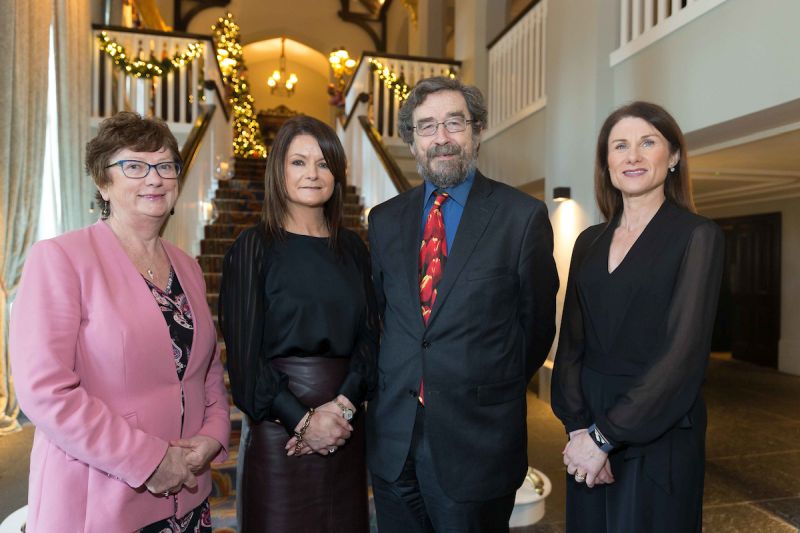
Real Christmas Trees Should be Celebrated as Part of Our Way of Dealing with Climate Change…Professor John Fitzgerald
Professor John Fitzgerald, Chair, Climate Change Advisory Council, keynote speaker at the Shannon Chamber President’s lunch with (from left): Margaret Murphy, Southern Region Waste Management Office; Helen Downes, CEO and Mary Considine, president, Shannon Chamber. Photo: Eamon Ward.
“Real Christmas trees should be celebrated as part of our way of dealing with climate change as there is carbon fixed in the tree and the growing of the tree itself provides alternative activity for farmers,” stated Professor John Fitzgerald, chair of the Climate Change Advisory Council in his address to the Shannon Chamber president’s lunch held in Dromoland Castle Co Clare.
The lunch, which was sponsored by Local Enterprise Office Clare and Southern Region Waste Management Office, was the third address on the topic of climate change given by Prof Fitzgerald to Chamber members in recent months.
“The fact that I have been invited to address Dublin, Belfast and Shannon Chambers clearly demonstrates that we are all taking climate change a lot more seriously,” he said.
Stating that the challenge for policy in dealing with climate change is completely different from other policy issues, due to the fact that the really serious consequences of climate change will be felt by future generations, he added: “Changing habits will involve disruption to our lives so greater focus will need to be made on communicating how to initiate such change.”
While the Government has signed up to raising carbon tax at every budget over the coming decades, Prof Fitzgerald stated that we still have a long way to go.
“We may be the success story of Europe in renewable electricity but we are a failure in climate change; we are heading in the wrong direction. With seventy per cent of the emissions in Ireland controlled by individuals, if we are to decarbonise, it is we, the people of Ireland, who must make the decision to change,” he stressed.
“Economic instruments will be needed to initiate this change and the incentive to avail of them will need to be communicated in a convincing manner.”
Touching on areas as diverse as house retrofitting, transport and agriculture and their impact on climate change, Prof Fitzgerald stated that change in each area must be linked to incentives to generate change.
“Individuals cannot lose heavily because of our climate policy. It is important the policies are seen to be fair. If unfair, they will not work; they will not get buy-in from the people” he stated.
Welcoming Professor Fitzgerald to the lunch, Shannon Chamber president Mary Considine said: “We are increasingly being reminded that if we go on treating the earth as if there is no tomorrow, there will be no tomorrow. Every country therefore needs to take measures to tackle climate change. It is not an option; it is an imperative.”
Citing the General Secretary of the United Nations Meteorological Organisation, who recently revealed that the levels of heat-trapping greenhouse gases in the atmosphere have reached another new record high, Ms Considine added: “If this trend continues, our future generations will be confronted with increasing severe impacts of climate change, including rising temperatures, more extreme weather, water stress, sea level rise and disruption to marine and land eco systems.”
Stating that the Chamber network in Ireland has a clear vision of what the collective Chambers need to do, as set out in Chambers Ireland Sustainable Development Goals, Ms Considine urged attendees at the lunch to also look at ways in which their companies could improve the energy efficiency of their processes, buildings and transport; replace fossil fuels with renewables in their processes, buildings and transport; improve the way in which resources are used in the supply chains and; be innovative across their production, distribution and marketing activities.
“These is little doubt that we cannot continue to operate as we are. Change in our operational behaviour is not an option; it is essential, “she concluded.
